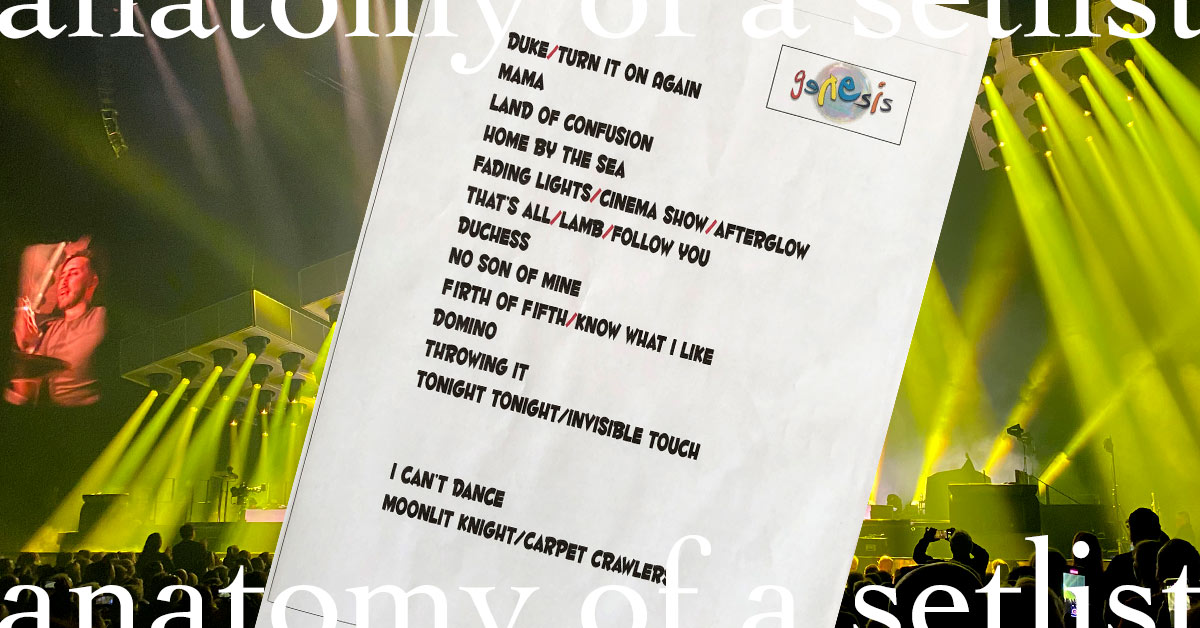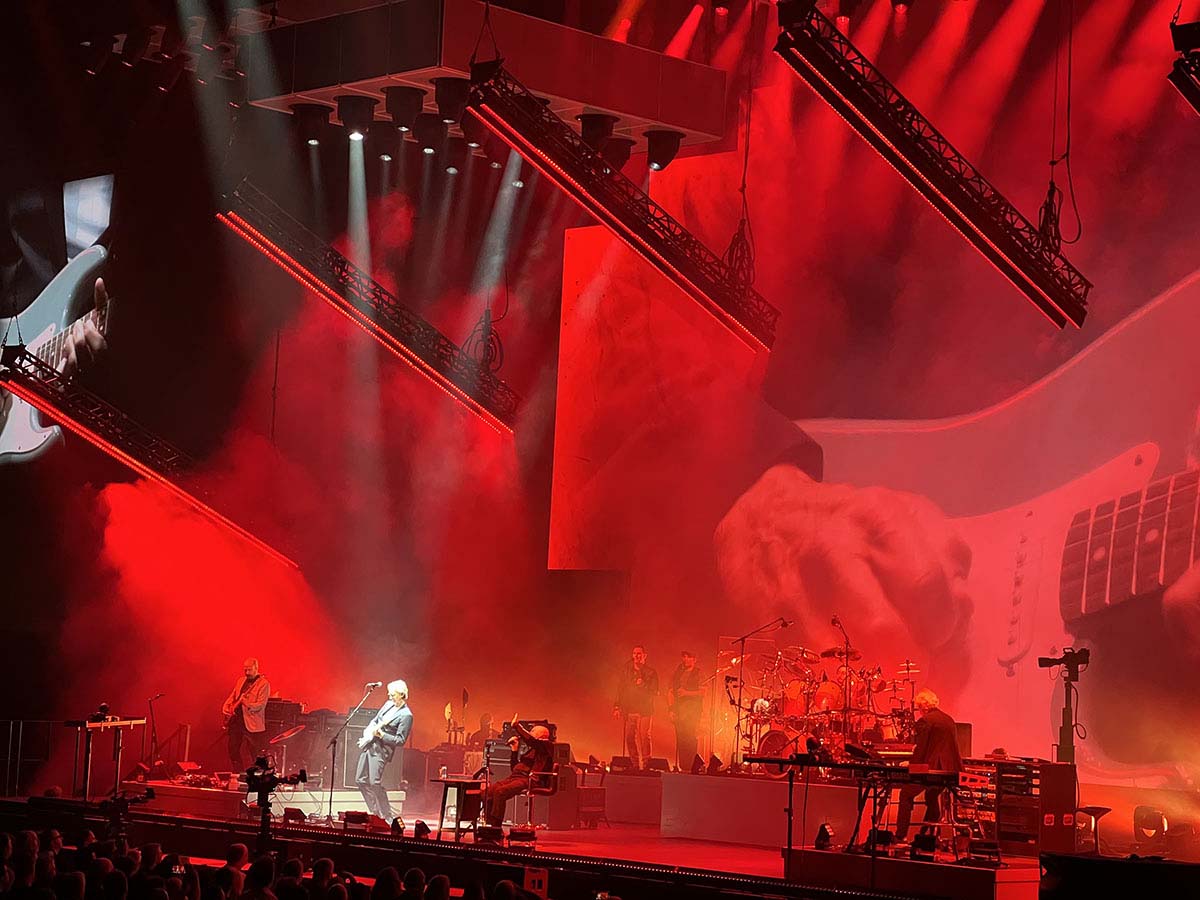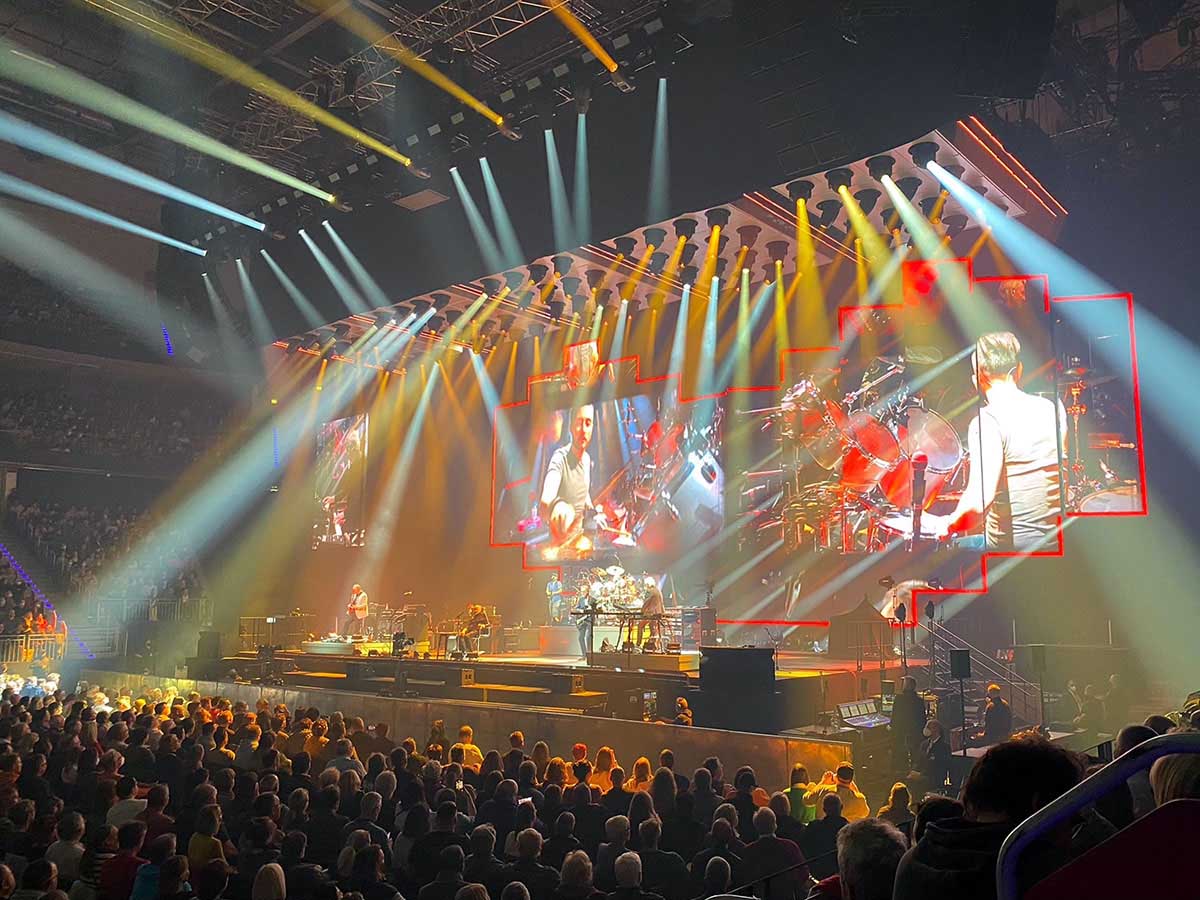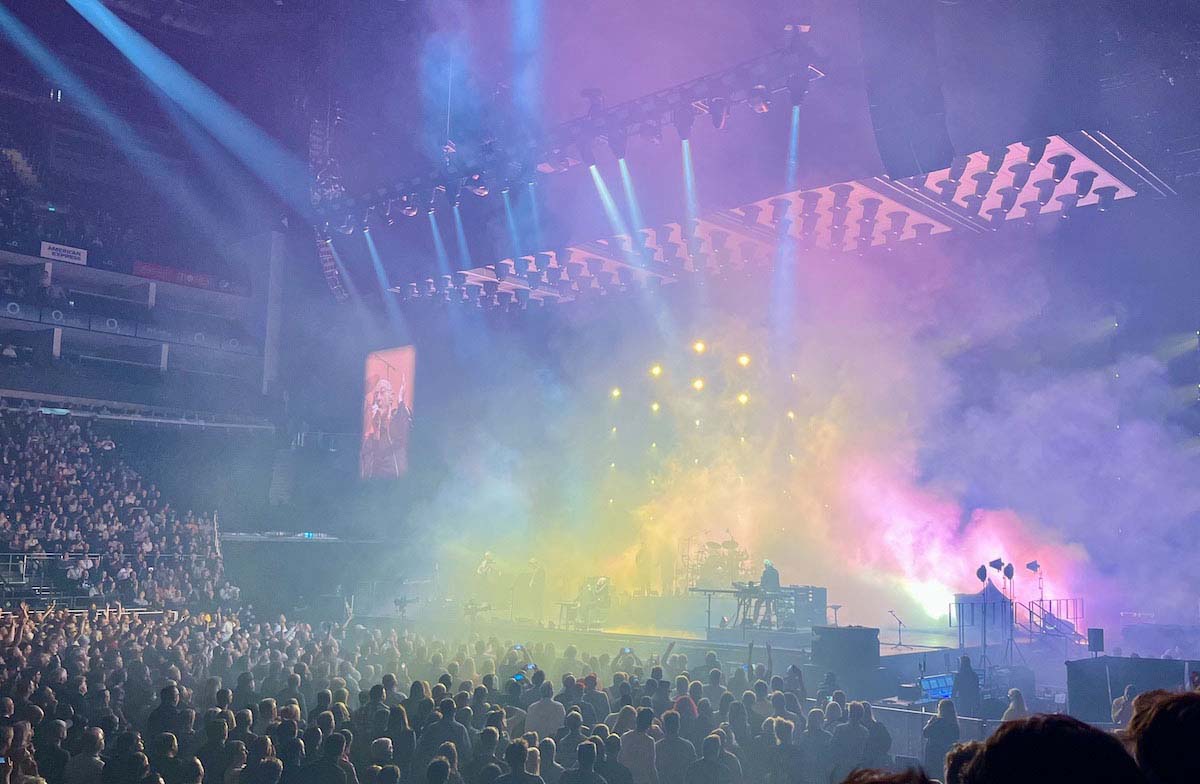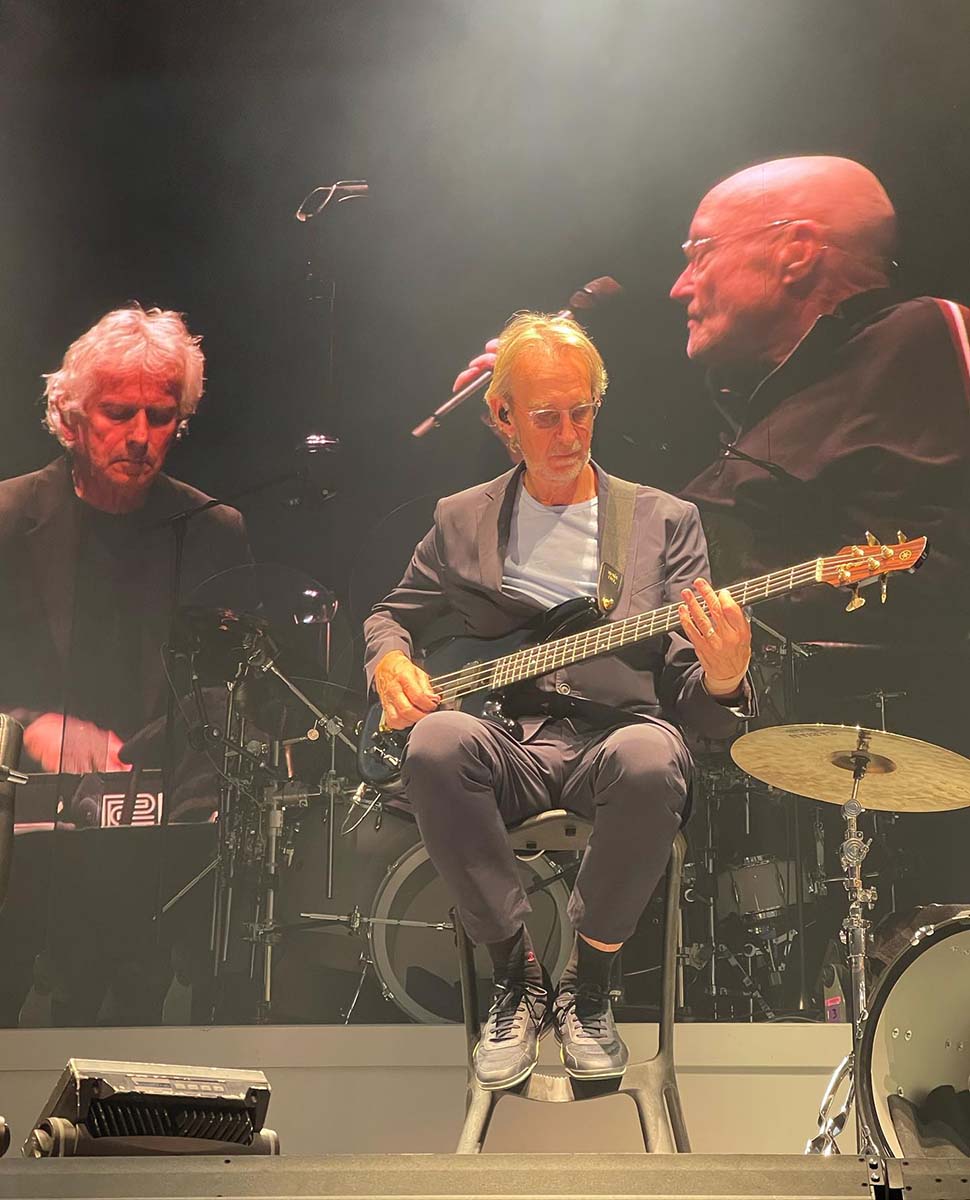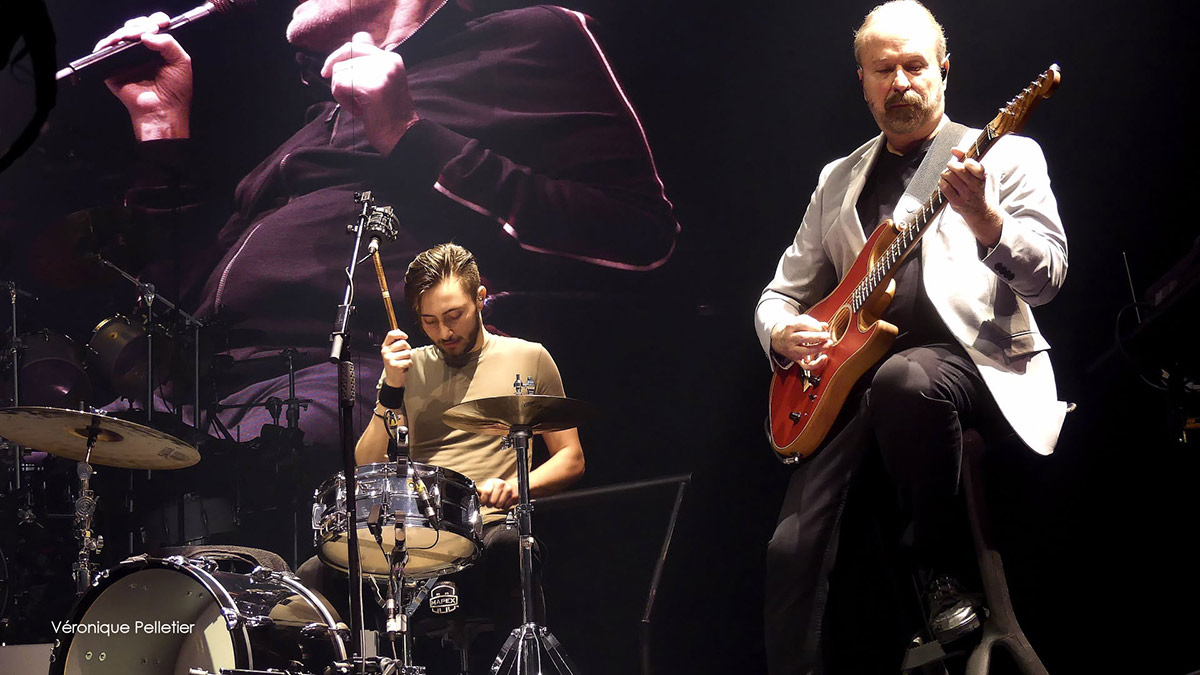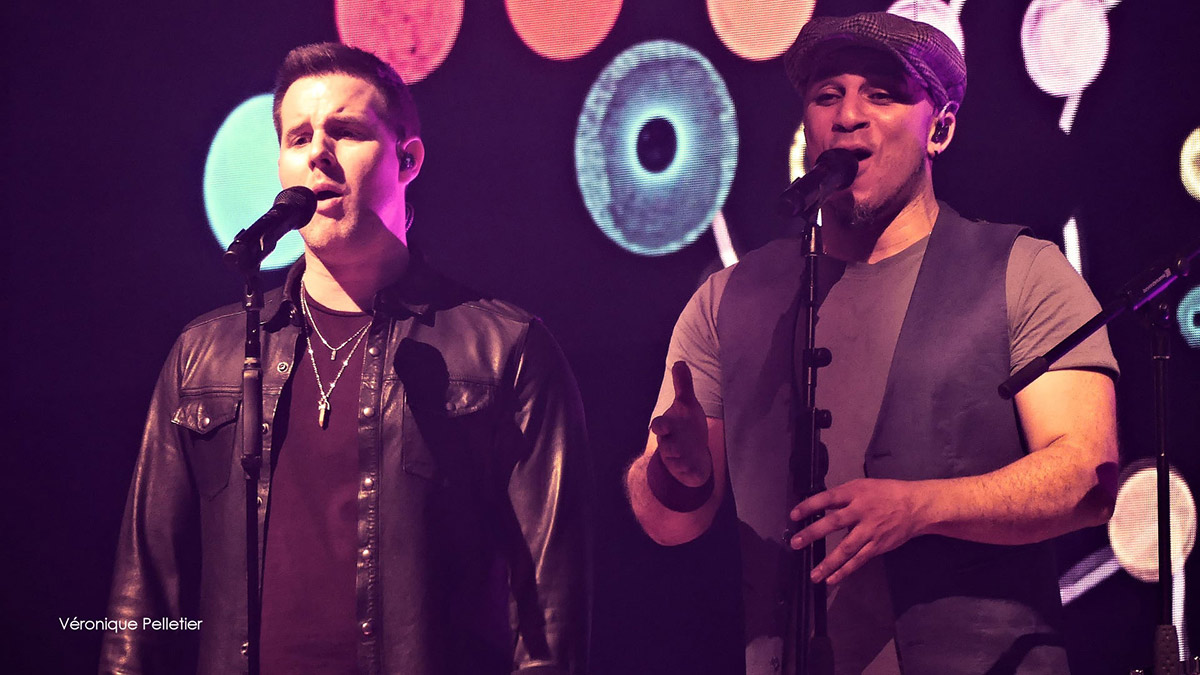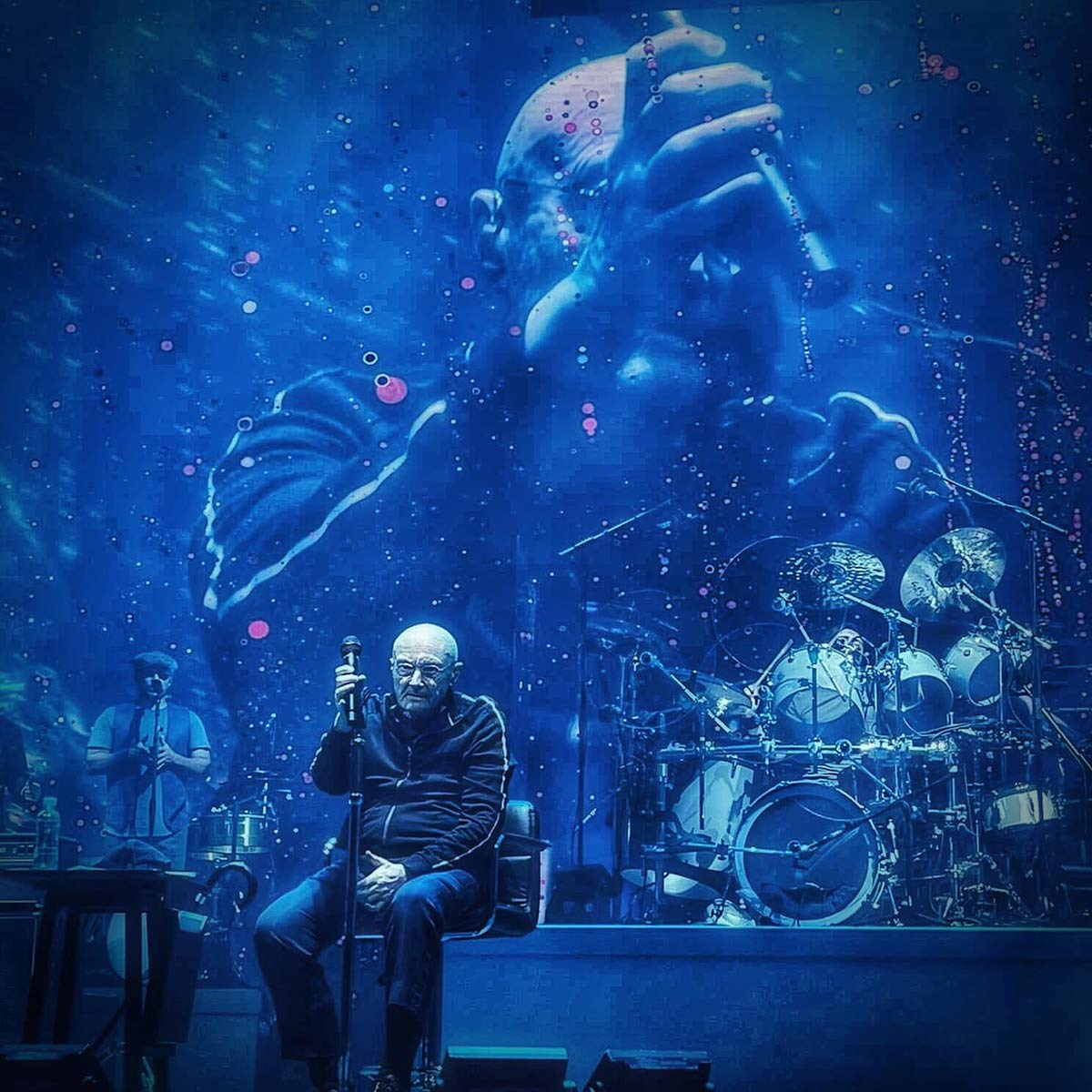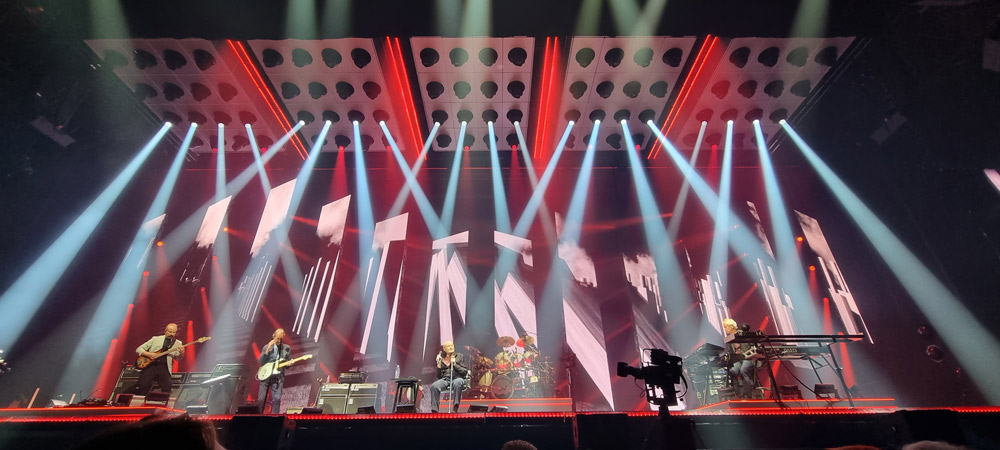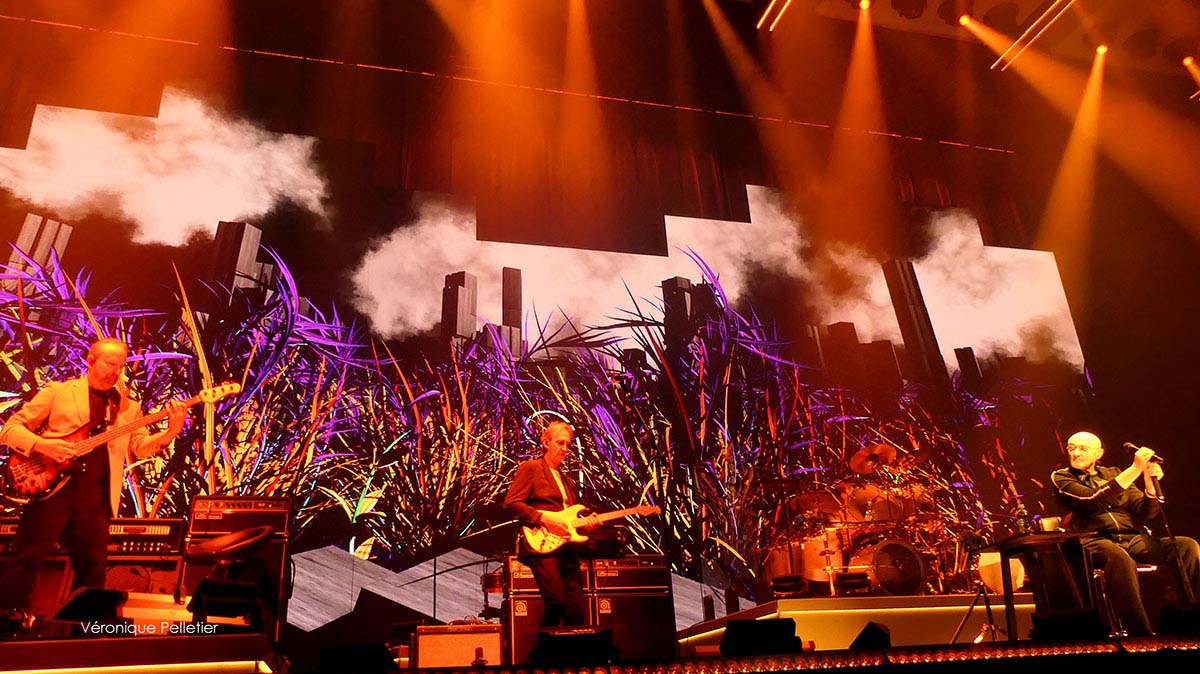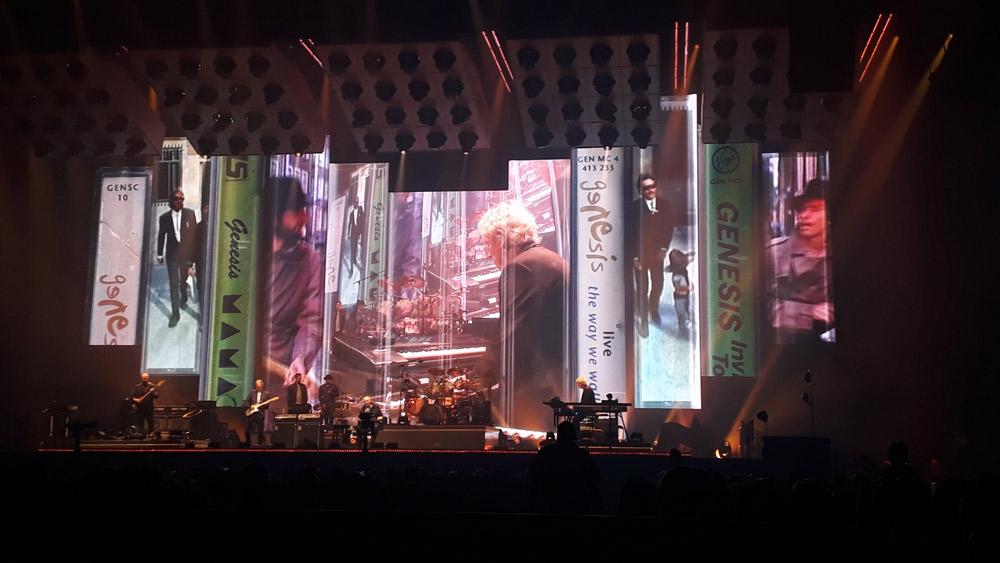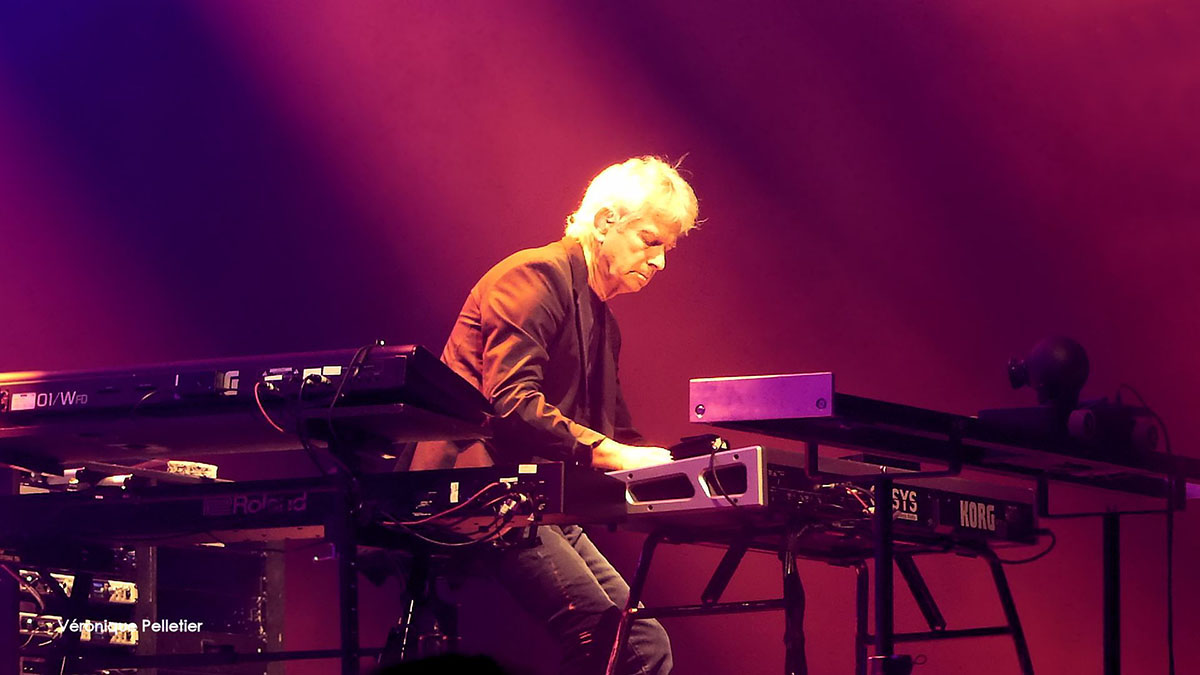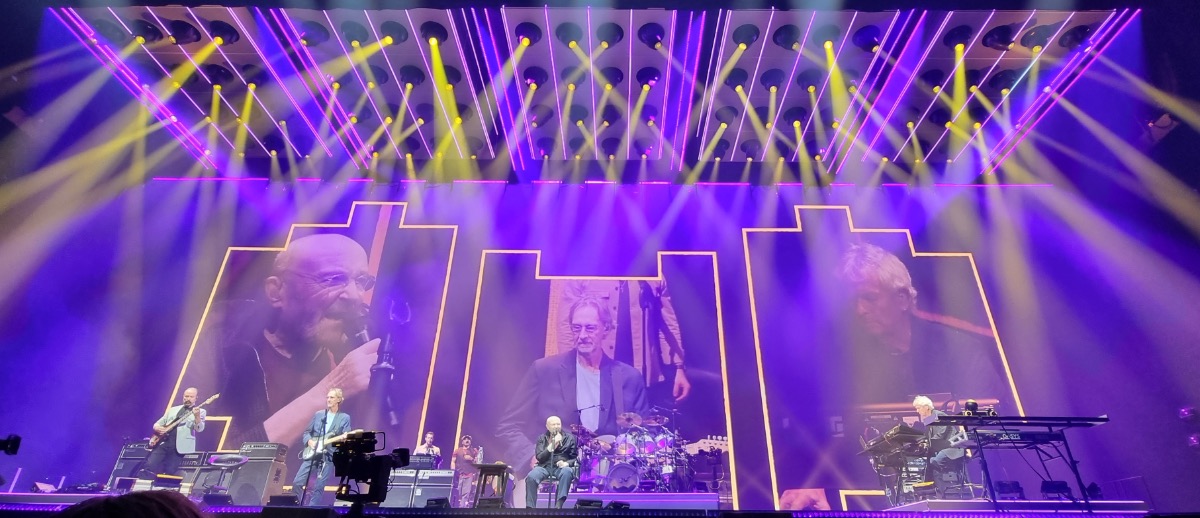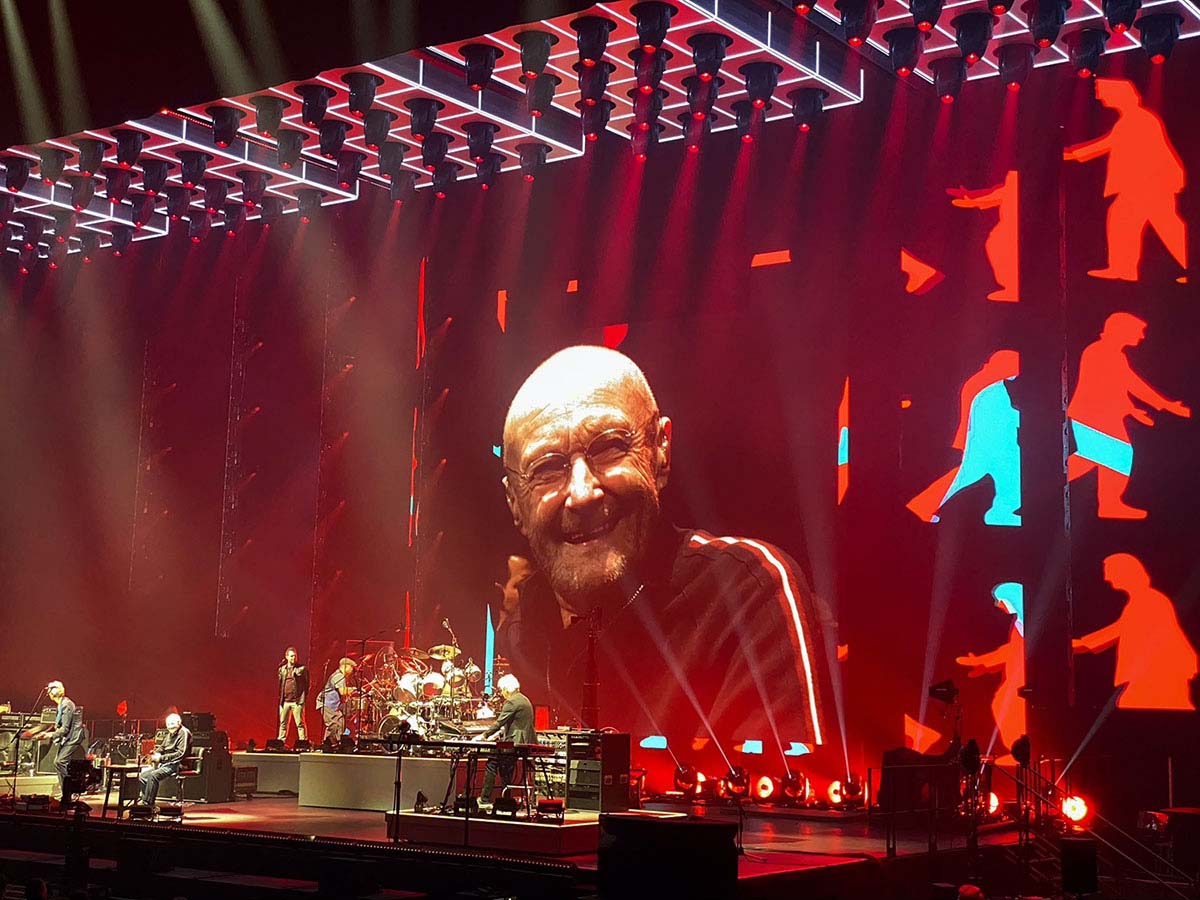- Article
- Read in 24 minutes
Genesis – Anatomy of The Last Domino – setlist analysis
The setlist of the last Genesis tour was a big topic of discussion among fans for months. Jan Hecker-Stampehl analyzes the setlist of the Genesis farewell tour.
When Genesis concluded their Turn It On Again tour in 2007, many were sure that “that was it” in terms of Genesis live. I attempted an analysis of the setlist at the time,and I surely was mistaken in my belief that I could try to present this as objectively as possible, or at least try to understand it from the band’s point of view, that is, to take Genesis’ perspective into account when they were choosing the songs back then.
If I try again now, I won’t even pretend to attempt anything else but a highly subjective run-through of the setlist, which remained identical over the duration of the tour with one exception (as, after all, one had been used to with Genesis for many years). I attended several concerts on the tour, but I’m not offering a review of any of these individual concerts here, but rather a summary based on the various facets of the individual concert visits. Since these are subjective impressions, a discussion is not so easy, because they are my personal perceptions. But I explicitly invite you to discuss the setlist in the forum and let us know what you, dear readers, feel differently, similarly or not at all.
Duke’s Intro (Behind the Lines/Duke’s End)
Yes, hello, it’s 2007 again! Genesis start just like they did 14/15 years ago – is that apt? Well, even less than in 2007 there was a new album to market in 2021/22. But the fanfare-like beginning of a live concert with the majestic opening chords of Behind The Lines is just too good to not use it again now. Even if the statement in 2007 was at least partly different (look here: Phil Collins was first and foremost the drummer of this band), in 2021/22 you can still point to the band’s strong instrumental tradition with this opener and also underline the fact that they were not always pure hit single producers. Besides, as part of the audience, you can settle into the concert experience, so to speak. The light show also sets the first accents; the high quality of the stage presentation is underlined right at the beginning.
Turn It On Again
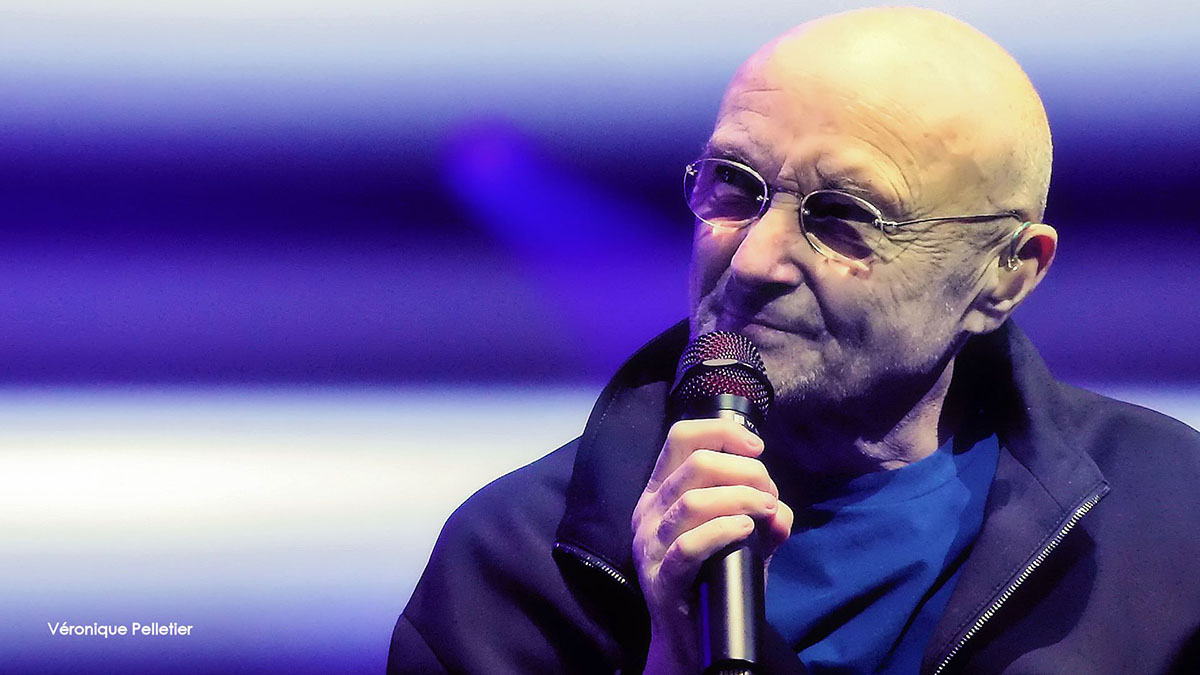
The transition to the next piece makes the informed fan think of the Duke Suite, but also of the many parallels with the last tour. But personally, I’m very glad that Turn It On Again was brought to the beginning of the show, after it had been the encore on so many tours. This way, the concert gains a good momentum right at the beginning. When the song really gets going, the trio of Banks, Collins & Rutherford appear on the really unbelievably huge video screen – cheers erupt! While in 2007 it was still the title song of the tour, it is now Genesis’ invitation to themselves – but somehow also from the audience to the band: “Come on, start the engine one last time!”
Mama
Somehow, at the first notes, I initially have the feeling that Mama comes a bit early in the evening after all. Then you are very quickly drawn into the eerie atmosphere of the song by the video & light show and the ominous synthesizer sounds. And then the first shock: how much lower is this compared to 2007? At first you may hardly recognise Phil Collins’ voice, but you soon realise that the song has become even more atmospheric, almost sinister, due to the transposition downwards. The substance of the track remains, an additional note is added. I can’t escape the mood that Genesis create here, well, I don’t want to…for me it’s the first big goosebump moment. Have I ever perceived Phil’s sinister laughter as so threatening and nasty? Do I get the feeling that this now is an old man reliving his dirty youthful fantasies? After the euphoria spread by the first songs, am I now diving into the dark side of Genesis? Yes, yes, yes!
Land Of Confusion
After the first long announcement, saying that since the war of aggression on Ukraine the song now refers not only to Covid-19 but also to Putin’s war against the neighbouring country, the band rocks the song like never before. Back in 2007 I was relieved to see that the song had finally become the rough rock song I had always seen in it (but which was plastered over by e-drums and 80s synth sounds), now Land of Confusion has finally arrived in the rock arena, not least thanks to Nic Collins’ energetic drumming. Again, the video animations shown for this song have a very spooky effect on me: If the toilet paper rolls tumbling from the sky two years later only seem like a curious memory of the first Corona Lockdown, the masked suit men with their sunglasses and their almost robotic movements are really quite disturbing.
Home by the Sea / Second Home by the Sea
Home By The Sea – again? I have to say there was a time when I was very annoyed by the fact that Genesis have basically been varying a setlist with a few additions since 1987 – which is of course unfair and also not entirely true. But it’s also a little true, especially when Phil Collins brings the same introduction as he has done since time immemorial. Collective ghost conjuring, everyone seems to still know the gag (from their own experience or from the BluRays…). But what can I say: I still enjoy this Genesis party trick! I giggle every time, but at the same time I am caught in a kind of nostalgia… but then the song comes on and I’m more than ready to lose myself in its mood this time!
For me, Home By The Sea (Second Home By The Sea I subsume as the instrumental part of the same 10-minute song) was, alongside Driving The Last Spike; Tonight, Tonight, Tonight; Fading Lights (both in the full versions) and of course Domino, a representative of the genre Genesis pop-era longtrack – certainly smoother and more straightforward than any of the band’s 70s epics, but still an invitation to lose oneself in a story song.
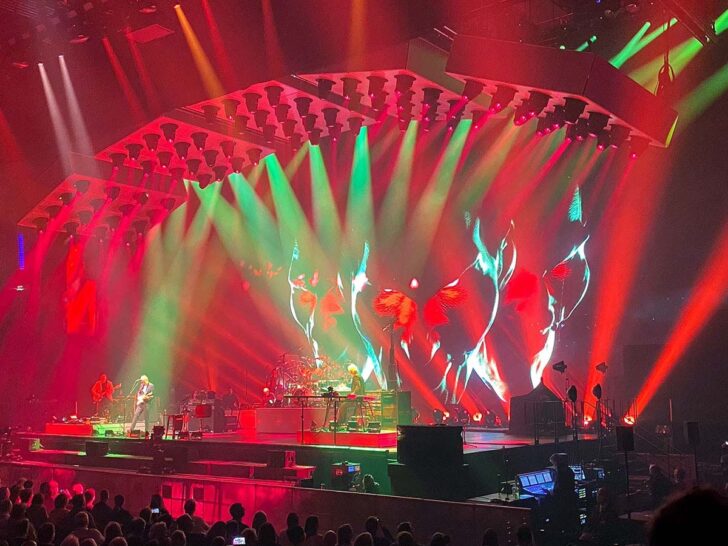
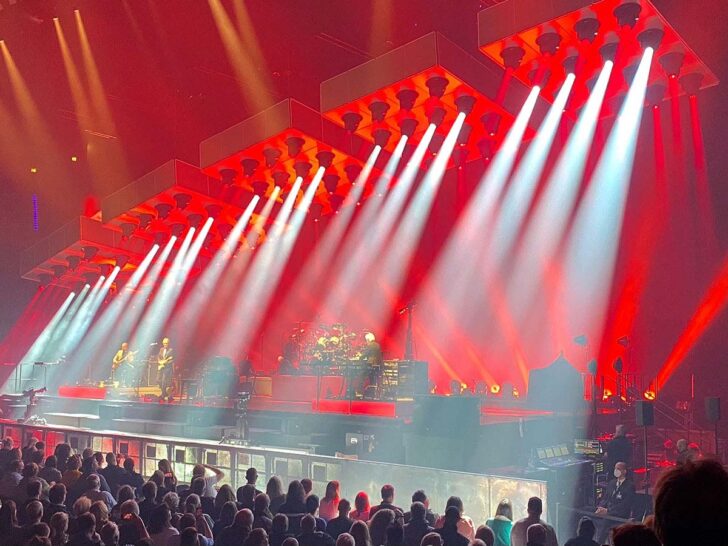
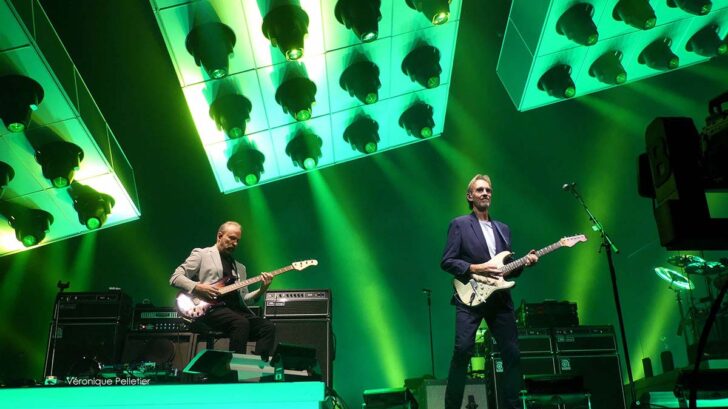
Here, the animations on the video screen – especially in the first, more vocal half – are very effective, underlining the ghostly atmosphere very successfully. Phil Collins has to make an effort here for the first time, it seems to me, the song demands quite a bit from him. Especially in the very rocky, sprawling instrumental part, it becomes acoustically very clear to me how Nic Collins approaches the drum parts. On the one hand, the electric drum sounds of the studio recording are used, on the other hand, he plays them with the verve of a live hard rock drummer who wants to get everything out of it – yet also adds his own touch with some very targeted accents. The way the giant dominoes with the lights hanging directly above the band descend on the musicians in the instrumental part, are waving, flaring up, underlining the music – that’s really great to watch.
In general, it is noticeable that at several points in the concert there is simply a reliance on the effect of the mere lights. This seems to me like a reference to the great Vari-Lites sceneries that were used so magnificently on the tours of the 80s, before video screens made their big entrance. So in a way, I think for the first time here, there is also a kind of self-quotation in the lightshow, which again emphasises the character of this tour as a farewell to the fans and as a last show of work.
Fading Lights / The Cinema Show / Afterglow
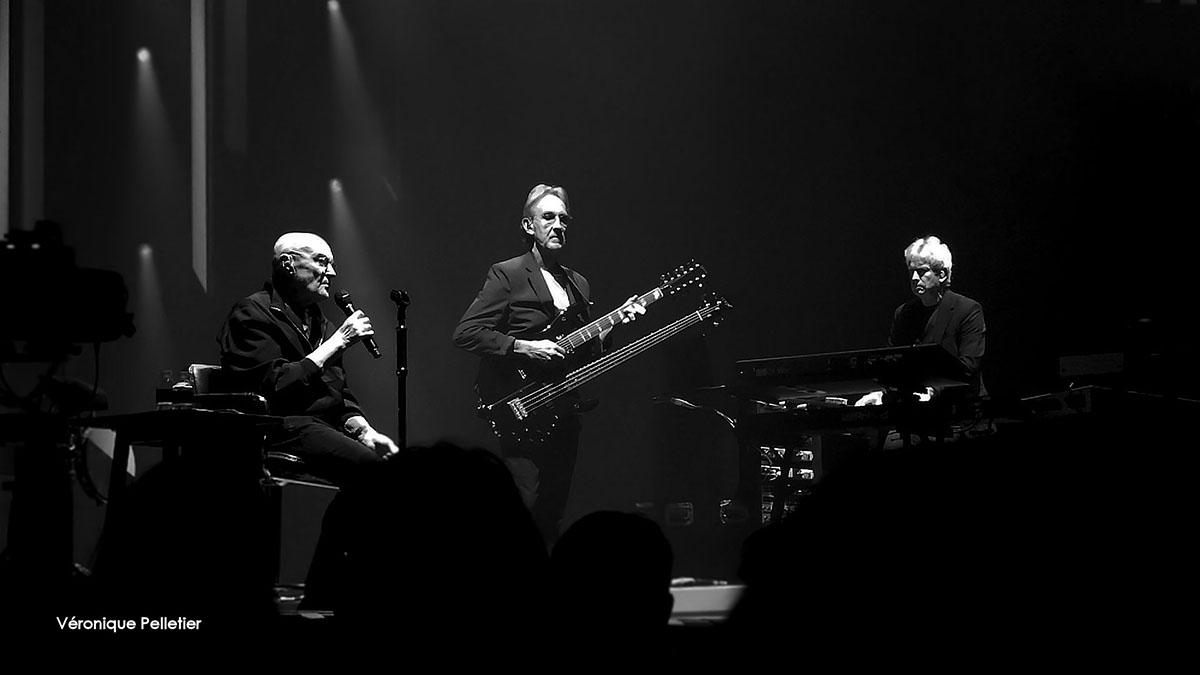
What a surprise: Now they shift down a gear and sing Fading Lights, my favourite track from the album We Can’t Dance, along with No Son Of Mine and Living Forever. Daryl and Nic leave the stage, and just like in 1992, only the three Genesis members (and the drum machine) play the song. Phil Collins’ voice breaks again and again, one can see it as tragic that he himself cannot bring across even such a soft vocal part anymore (in strange contrast, however, he’s faring much better in much more demanding pieces…), but one can of course also see it that way: song and brittle performance enter into a perfect symbiosis to make a very heart-touching statement about the transience of all things…
Then all of a sudden, when I’m already looking forward to the instrumental section (what does Nic make of it, whoopee!) – suddenly a blatant break and the song segues to the instrumental part of The Cinema Show – whaaaat?! Is Fading Lights now supposed to be the replacement for In The Cage, so to speak?! No, but: Genesis have once again given in to their penchant for strange medleys. But from about the third note of Cinema Show onwards, I already forgot about it, because this classical Genesis gem is performed on the usual high level. You can think of it this way, I’m thinking to myself: you could see especially the 70s prog songs as a kind of a check for Nic Collins’ real drumming skills. Drumming the straight pop songs, well, some people could do that well, but what about the odd rhythms, the idiosyncrasies in the drum parts his father created decades ago, can he do that, I ask myself – and lo and behold: he can, and how well! At this moment, his drumming excites me even more than the 2007 version, when his father was still holding the sticks.
Finally, the typical, well-known transition to Afterglow follows, which this time reveals its anthemic qualities even more strongly. In addition, there is a massive use of dry ice fog (is this fog really still created with dry ice?!) and light, which brings tears to the eyes of all connoisseurs. It’s as if the photo from the Three Sides Live inner sleeve comes to life. Here, as a long-time (even as a post-born) fan, it is very hard not to be moved…one comment by the Kölner Stadtanzeiger (the local newspaper in Cologne) on this part of the show reads as follows: For the end of the world, you’d have to play Genesis. Basically a very straightforward song, in terms of harmony and flow it is similarly simple as some of their pop songs, but the hymn-like quality that has always been inherent in Afterglow elevates it to other spheres. Here, on vocals, I notice for the first time how much the two backing singers contribute to Genesis often being much closer to the studio versions on this tour than on any previous tour. Tony and Mike were just never the most gifted candidates for the additional voices Phil recorded in the studio – which often enough gave the songs an extra spice. Thankfully, though, it doesn’t get as cheesy here as it did on the 1977 studio recording…
Acoustic set – preliminary remarks
Of course, this is neither an acoustic nor an unplugged set, when the roadies suddenly put a keyboard, a smaller drum kit and two extra bar stools on stage to create a bit of a homely living room atmosphere on the Genesis stage. It is, strictly speaking, not even new, because there was already something like this in 1998 on the Calling All Stations tour, which Tony Banks and Mike Rutherford would probably rather forget – but yes, they already had an “acoustic” set on that outing. Back then tit featured the Moonlit Knight, Follow You Follow Me, Lover’s Leap (i.e. the beginning of Supper’s Ready, gave gasps of excitement back then!) and Not About Us. So now we are in a similar situation, which really has its charm. When someone asked in a new Genesis Facebook group created on the occasion of the tour why on earth they called this set acoustic when Nic’s drums were the only truly acoustic instrument, I replied as follows:
Because stripped-down set with known songs in slightly altered arrangements, using devices emulating real acoustic instruments because using the actual stuff would have been quite laborious and especially miking a real piano would have been a pain in the arse would simply have been too long.
That’s All
The fact that the biggest surprise comes right at the beginning of this, let’s say: reduced set, says a lot. That’s All was last played live in 1987 (okay, there were exceptions at festival performances in 1988 and 1990, as well as at a dress rehearsal for the Calling All Stations tour in 1998), and even if you’re not the biggest fan of the pop era, you take notice. Or, if you’re a terrible compromiser like me, who finds something good in all eras (even the one with Ray Wilson) but actually tends more towards the darker, epic pieces like me, you can nevertheless rejoice at this choice. When it started, I honestly cheered like a little child….
And something happens here that happens with many songs on these concert evenings: The lyrics always convey new messages: here it’s the line I can’t feel a thing from my head down to my toes, which takes on a whole new meaning in view of Phil Collins’ state of health (numbness in his left leg after back surgery).
The transfer of the organ solo to the acoustic piano sound works without a hitch, and Daryl Stuermers’ solo on the semi-acoustic guitar really gets things going, and in places there’s almost a hillbilly feeling, I think. A real good mood moment.
The Lamb Lies Down on Broadway
My first reactions: Ah cool, they’ve made the endeavour to create a new song out, how unexpected…nooo, and then oh, why are they playing Fields of Goldby Sting now? And then ahaaaaa, waaaas?! when I recognise The Lamb…and then (kudos to @March Hare in the German-language Genesis forum) comes the realisation that Genesis have never rearranged a piece as radically as in this case. My suggestion: don’t call it acoustic version, because it’s not really, how about late-night-hotel-bar-laid-back version?
I think it’s brave that they approached the song this way, tried something new, for me it’s very refreshing. If I had to choose, I’d prefer the original arrangement any day, but in a live situation, why not do it this way for a change?
Follow You Follow Me
Two hearts beat, ah, in my chest (as many Genesis fans might say): on the one hand, they have produced so much cool music and have become more and more famous over time, that’s cool too. Without their popularity, which grew so immensely in the 80s, I might not have discovered them … who knows! On the other hand, I would also like to have them just for me, and when a less well known song is played at a concert, which many of the visitors who only listen to the radio hits don’t even recognise, this feeling also sets in a little bit.
How do I feel about Follow You Follow Me then? It’s quite possible that the band wouldn’t have continued to exist beyond 1978 without such success. But the song is also super corny. But hey, the other day I noticed again that I find Your Own Special Way – on the supposedly last prog album by Genesis, namely Wind & Wuthering, of all things – I find it even more cheesy, and unlike Follow You Follow Me, I even find Your Own Special Way downright embarrassing.
Well, then, wave your mobile phone torch lights, everyone…and meanwhile I wonder why I could live with the song much better in 2007. Was it the fact that Phil Collins performed it playing drums and singing at the same time? Actually, traditionally I’m not an enemy of this song – it’s strange what happens to you sometimes. Knowing me, I’ll enjoy listening to the song again in a few months, but at this point in the concert, for the first time, it’s too much one hit after the other syndrome for me..
Duchess
No. What. Really? Oh. My. God. How awesome. How cool is that? They’re really playing Duchess! Avoiding spoilers in 2021/22 was admittedly even more difficult than in 2007, and I’d already heard some rumours. This song was indeed a single from Duke in 1980, but the last and least successful by comparison. I always liked the track, especially in the context of the Duke opening trio of Behind The Lines, Duchess & Guide Vocal. But the live versions from 1980 and also 1981 seemed a bit anaemic and somehow choppy, I always thought; they never did justice to the epic breadth of the song, the bombastic grandeur of studio recording. And what has it become now?
First there is the throbbing of the drum machine, gradually spherical keyboard lines join in, fireflies appear on the video screen, the guitars also start quite appropriately cautious. At this moment, Genesis are more atmospheric than at any other time in the concert, it’s more like a sound collage, which gradually thickens, becomes more melodic, the dynamics continue to increase, the drums come in very gently at first with swirls on the snare, and then the explosion when the vocals start – woaahhhh!
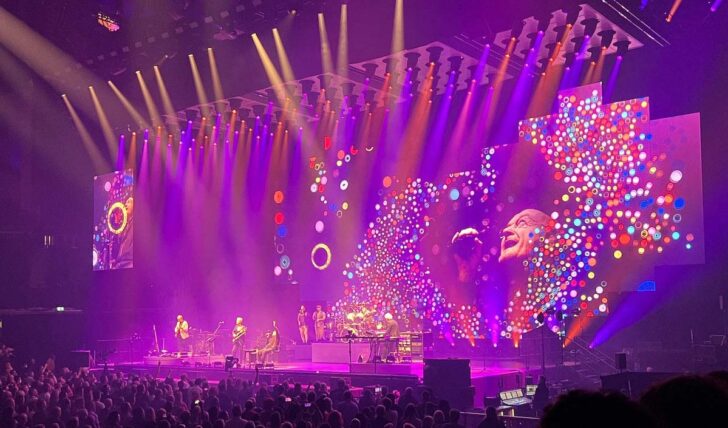
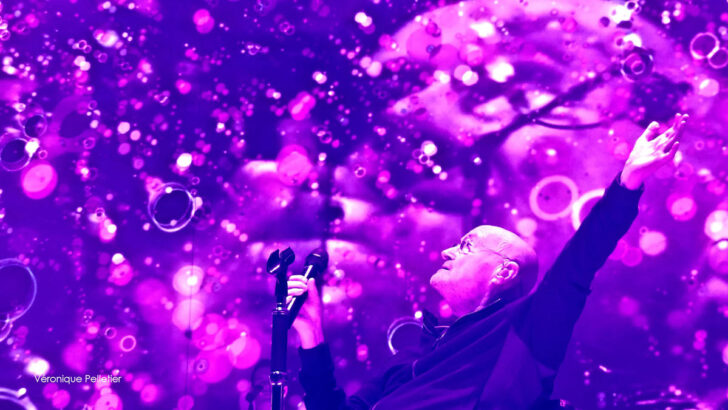
For me, Duchess is the undisputed highlight of the entire set. Why? The song, which was already very atmospherically dense in the studio version, has become an unbelievable soundscape here, the song thrusts itself upon me with full force and totally pulls me along emotionally. Everyone gives their best here, and Tony Banks must be particularly happy, as he considers Duchess to be one of the best Genesis songs ever – and in a radio interview about the tour in September, Phil Collins also called it his favourite Genesis song.
I have to admit, it wasn’t my favourite song until now, although Dukeis my number one album from the Phil era. But in this version it has ascended to the Olympus of my most beloved Genesis songs. The fact that it has such an emotional impact on me on this farewell tour certainly has to do with the lyrics, which deal with the arduous rise and later the deep fall of a singer, i.e. reflecting the imponderables of a career in the music business, which of course reminds us of the ups and downs that Genesis and Phil Collins themselves have experienced, from audience darlings to all the vilification that there has also been. The fact that the durability of such a career should by no means be taken for granted and that the hard-earned fame can quickly slip away again is something that is not entirely foreign to the members of the band – even if they never fell as far down as the Duchesshere.
Added to this is a congenial visual backdrop, the video wall is used almost like an actual canvas on which light is used to paint instead of brushes. Camera images and graphic elements are combined with each other, the musical climax in the intro is skilfully illustrated by the graphics. In between, it looks as if Phil Collins’ face is framed by confetti or colourful soap bubbles.
Along with the acoustic set, the song is the major departure from the 2007 setlist, it hasn’t been in the live set since 1981, for me it takes on a whole new life in the version presented here, a truly fitting tribute and it also proves to be very epic. Wide-screen cinema in musical form, so to speak.
The introduction of the musicians follows, introduced by the new faces who are up there on stage, first the background singers and this new drummer ;o) . Nic Collins already receives frenetic applause, the audience appreciates his unbelievable performance in the light of his young years; there is probably also a kind of family bonus. Daryl Stuermer, the loyal soul, is also celebrated, until the applause for the three actual band members continues to grow into a big neverending cheer.
Medley: No Son of Mine/Firth of Fifth/I Know What I Like (In Your Wardrobe)
Another medley follows, with No Son Of Mine being played out in its entirety, but then it immediately continues with the instrumental part of Firth Of Fifth, which, as in 2007, segues directly into I Know What I Like. For me, No Son Of Mine is, next to Mama, the best pop single ever. The song is moving for me every time anew, a very serious topic, which is presented in a simple language that is understandable for everyone and very appropriate. For me, it’s moments like this from the pop era that always grab me and the song is, for me, one of the flagships of this period of Genesis’ so varied career. Also, I love the fact that Genesis released singles over six minutes long!
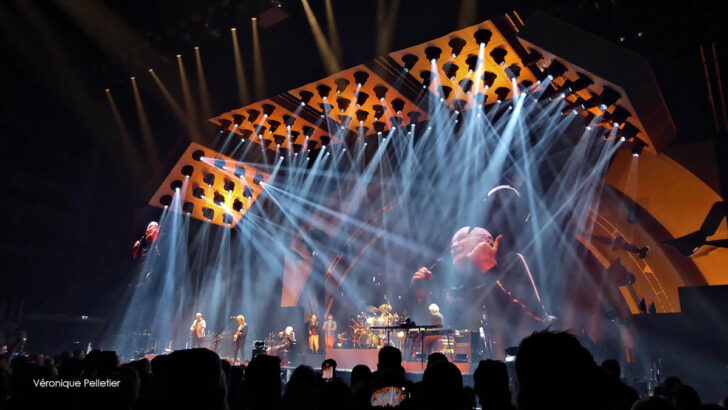
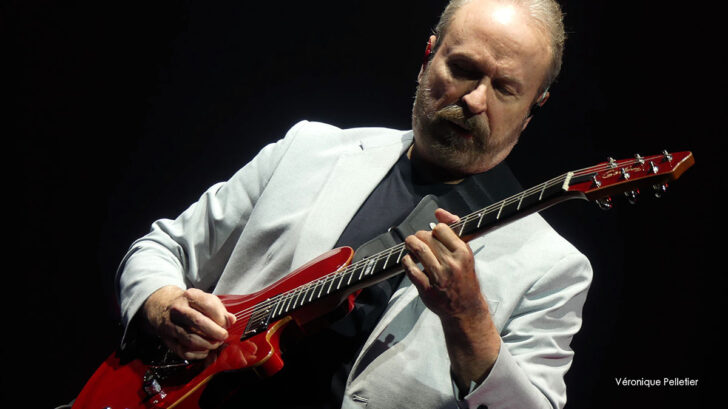
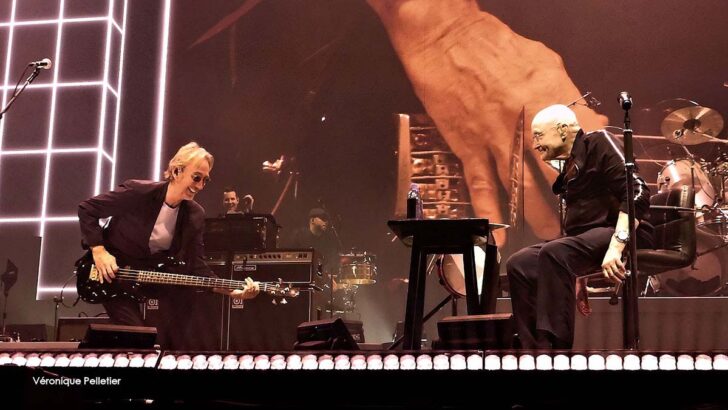
The transition to Firth Of Fifth again doesn’t seem very obvious, I think, and unfortunately Genesis haven’t played the song in full since the early 1980s. I would have gladly heard songs like Fading Lights or just Firth Of Fifth in full versions, but at least we get to enjoy a canonical moment of early Genesis: Tony Banks’ synthesizer solo is perfectly underpinned by Nic’s drums, and finally it leads into the guitar solo, although the style in which Stuermer usually performs it has long been the subject of controversy. In the context of the original song, Steve Hackett’s rather lyrical way of playing the solo always appeals to me much more, but when it came to playing the instrumental part in combination with other pieces, I found Daryl Stuermers’ version good – just two different interpretations. With the use of keyboards sounding much more like the mellotron of old, it comes to another hymnal moment full of sublimity..
The transition to I Know What I Like is well known by now, and if there is one thing that I find a bit unfortunate at several points during the concert evening, it is the lack of surprises – too often one already suspects or knows what is about to come. The first minor hit in the band’s history has long since achieved cult status and is a terrific sing-along, in places even a blare-along moment. Especially the spoken parts bring up the clearest associations with Peter Gabriel for me, and even if the song perhaps doesn’t have the greatest musical substance in Genesis’ oeuvre, it has an incomparable aura.
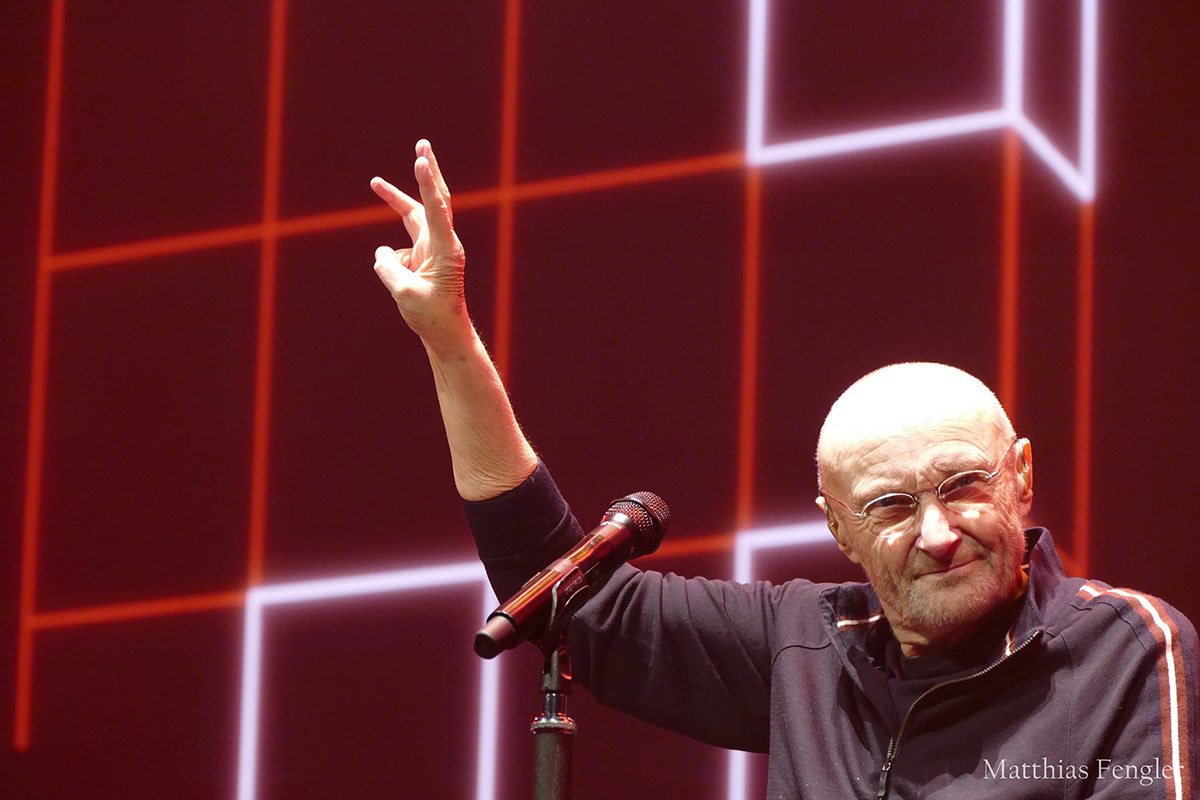
Is it the fact that it comes from one of the most grandiose albums in their discography? Or rather the very bizarre lyrics with probably the strangest line in a rock song, namely there’s a future for you in the fire escape trade? No matter, I celebrate the song because it holds so many memories and the segment from Stagnation that they always incorporate into the song casts the line of memories way back to 1970. I can become a bit more sentimental, even though Trespass is still the album of the Gabriel era that I listen to the least and therefore know the least (apart from the debut album).
Domino
Then the set continues with another pop-prog epic, the equally inevitable Domino. It’s introduced by another Genesis party trick, the audience participation game on the domino principle that has been practised the same way since the 1987 tour. What can I say? I know this from my own previous concert attendances and from all the recordings, of course, but again I have no problem playing along, being just as silly as everyone else. I just let myself go with it, see it as the fun moment it is and look forward to the song in the meantime. For a while I had been fed up with this song too, but now I can really enjoy it again. This sure is a longtrack, though pure length is not a sign of quality, but with Domino there are so many different moods it contains which make it so entertaining. This time I’m surprised from the first bars on how present and penetrating all the 80s sounds are, which I used to find annoying for a while, but which make it very special for me this time around. The fact that Nic Collins also uses the electric drum sounds from the studio recording brings the song much closer to my first encounter with Domino.
Maybe my changed perception is also due to the fact that I became a Genesis fan in 1986 and that Invisible Touch was the first album I got to know properly. So there is an additional level of nostalgia, even if it hasn’t remained my favourite album in the long run. But some things remind me of my youth, of a time when Genesis and serious rock music in general were still completely new experiences for me. The video screens are used particularly effectively in this song and the rotating lights during the galloping fast parts in the second part create a downright hypnotic effect. Wow!
Throwing It All Away
Just like on the album, Domino is now followed by Throwing It All Away, although the call-and-response part with the audience doesn’t work as well as it used to. I always waver whether I find this song okay or annoying. If I’d been told beforehand that they’d be playing the track, I’d probably have waved it off with thanks, even though I used to like the song a lot – but I somehow had “overheard it” at some point. Then something surprising happens again: the performance really touches me. The mood is a very tender one, perhaps because Phil Collins delivers this song in a restrained, almost fragile way. And of course there’s the visuals, which play heavily on my fan nostalgia. It’s funny that the spines from the cassettes of most Genesis albums are shown here, along with photos from the band’s history, and finally video cassettes, supposedly labelled by hand, although one wonders who had When In Rome dubbed or recorded on VHS in 2007 onwards…never mind, all those pictures make me very nostalgic indeed.
Medley: Tonight, Tonight, Tonight (truncated) / Invisible Touch
What follows is another medley that has been performed in this form by the Collins-led formation since 1992. I suffer every time, and again this time, that an epic as fantastic as Tonight, Tonight, Tonight has never again been performed live in its entirety after the 1987 tour. The build-up towards the end of the instrumental interlude in the middle, the atmosphere that then unloads, the more driving parts towards the end – I miss all of that in a live context. Oh well, I guess I’m biased: this song made me a Genesis fan in 1986 when I heard it on the radio and was immediately hooked. For me, the long album version is the one in which I learned to love it and it’s a crime for me to only play it half-way through.
A real shame, even though I know how demanding the song has always been for Phil Collins’ voice. But on the last tour they didn’t have any problems with lowering the keys for many of the songs so as not to strain his vocal chords too heavily. It’s a pity that I get that autopilot feeling again, especially during the well-known transition to Invisible Touch. Here the same applies to me as with FYFM: I don’t hate IT at all – it’s a good pop track that I still celebrated as the end of the set (including fireworks) in 2007. But somehow I cannot seem to get into the mood this time. Maybe it’s because Phil Collins is no longer as agile as he used to be? That’s more noticeable with a party song like this.
Encore
I Can’t Dance
Unfortunately, the autopilot feeling continues when the drumbeat of this hit song is heard, with makes most people around me enthusiastically sweep off their feet. Back in 2007 I Can’t Dance already failed to excite me, now I’m downright annoyed. I remember how in the remaster interviews in 2007, Mike Rutherford – almost disrespectfully – spoke about a number of pieces from the Genesis past, saying that they were typical period pieces, i.e. songs that may have worked in their time of origin, but in a way have aged badly. Well, from my point of view, I Can’t Dance has exactly that: aged badly. In 1991/92 it was still a great gag, all the more so with the wonderfully silly and self-deprecating music video in tow – now it’s downright torture for me. I realise that this has to do with the fact that musically this song gives me nothing at all. That said, I do by no means distaste pop-era Genesis, see some of my comments above. But firstly, Genesis have always reached me more through the dark, melancholic side of their work, secondly, there’s nothing here in this song that I usually get from the Genesis pop songs which I do like very much: great melodies, rousing rhythm. I’m decidedly glad every time the song is over at the concerts I attended.
Dancing With the Moonlit Knight (Intro) / The Carpet Crawlers
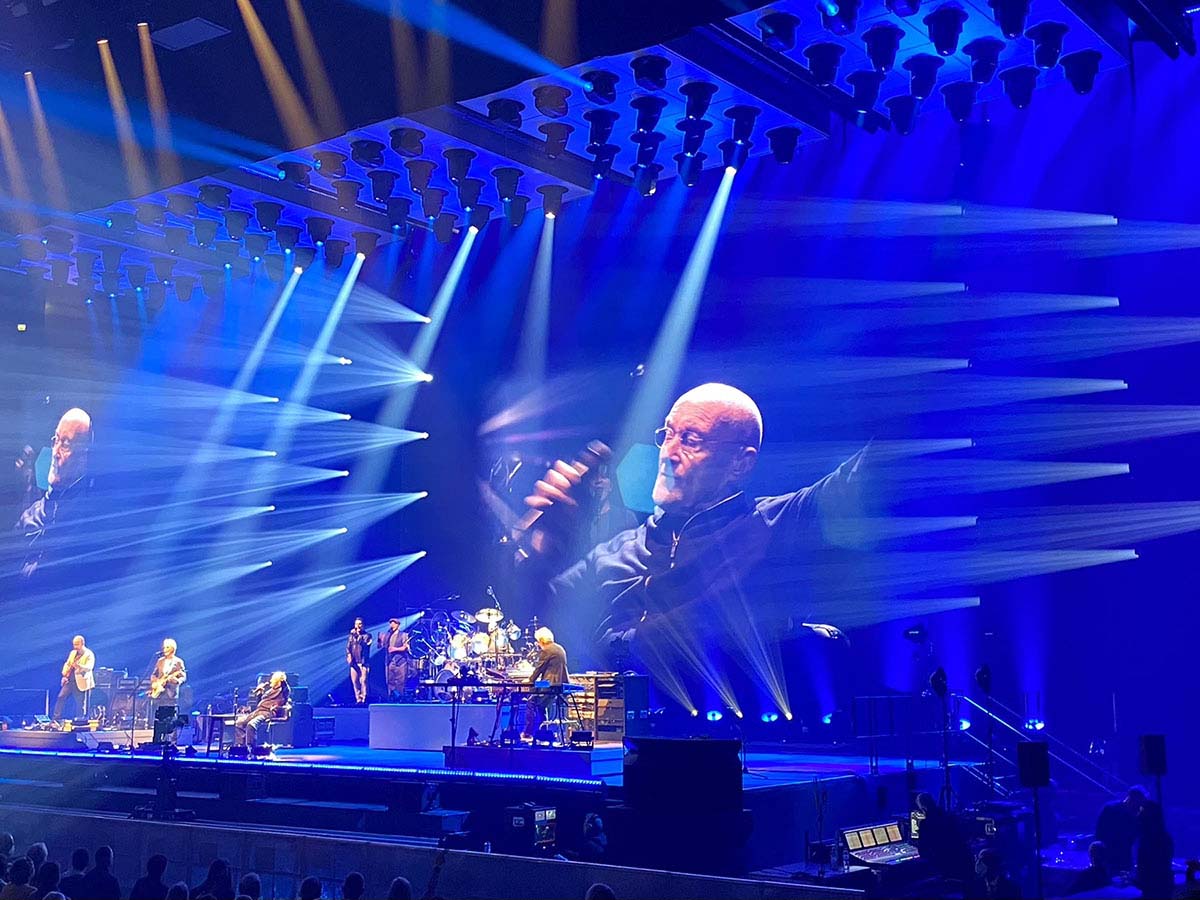
This changes abruptly during the second encore, which is introduced by a short quote from the first song off Selling England By The Pound, which gives me goosebumps. I realise that the longer I write this text, the more I run the risk of sounding like a representative of the faction everything was okay until 1977, then it got stupid– but that’s not me at all. Yet the package consisting of Moonlit Knight and Carpet Crawlers touches me much stronger on an emotional level than I Can’t Dance. Again, I think this track shows that Genesis were able to write simpler songs in the mid-1970s indeed – Carpet Crawlers is by no means a harmonically, rhythmically or melodically complex song. Of course, it must be its origin in the Lamb opus that makes it special, its long life as a live classic, the somehow conciliatory and calming mood about it. As in 2007, the song brings a concert with a wide emotional and musical range to a quiet end. Almost a good night song, which is even more fitting when you remember Phil Collins’ statement about this tour as “putting it to bed”.
The bottom line is, even though I’ve said a lot of critical things here, I was very much impressed with Genesis’ performance on this tour. This may be due to the fact that my expectations were not there at all in the beginning – living in Germany, I assumed that I would not be able to see any concerts in the UK or USA (too far, too risky in Corona times, too expensive anyway with travel costs etc.). Then there was the fact that I knew about Phil Collins’ health, I had seen him live solo in 2019 and was shocked at some points. The voice wasn’t quite up to it then. But Nic Collins already thrilled me then, and I found myself thinking I wonder how he would be playing more of the Genesis stuff, especially the longer, more complex songs.
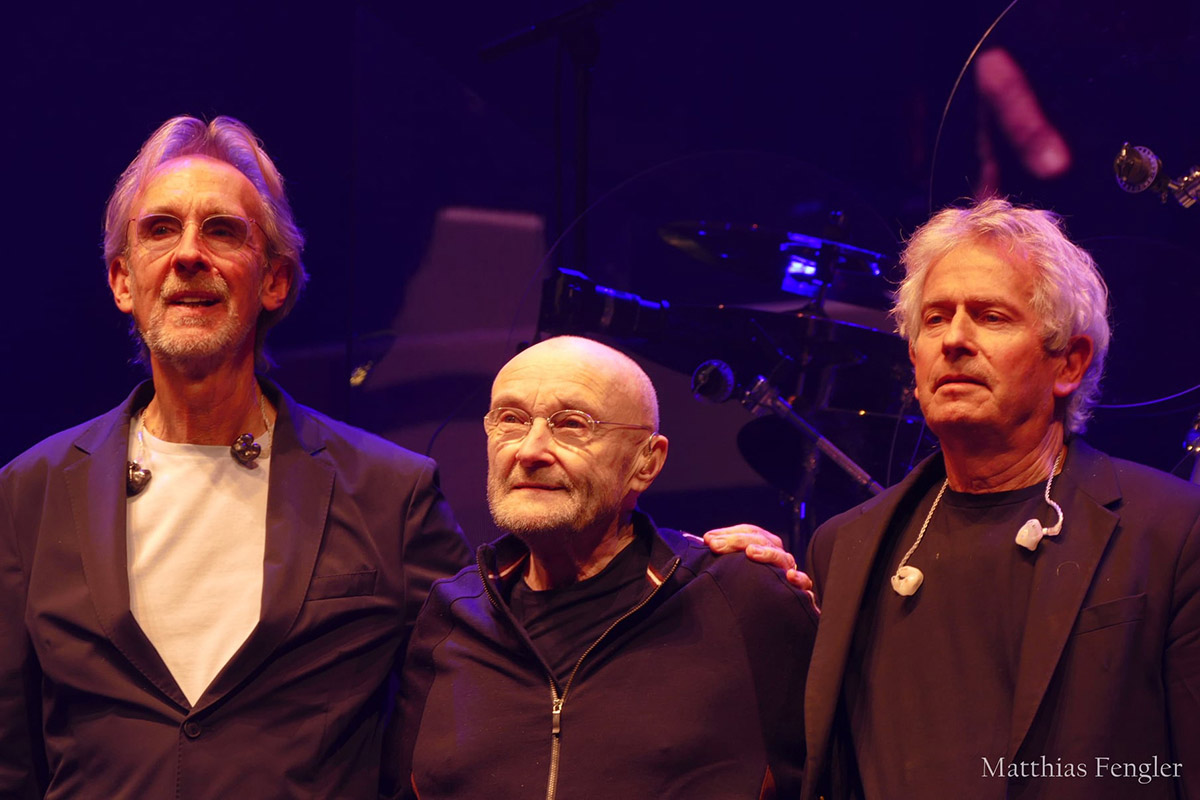
So then the German concerts were being announced in autumn 2021, I bought tickets like crazy – why? Because Genesis have been my favourite band since my early youth and I really wanted to say goodbye to them. But somehow I didn’t want to expect too much, so that I wouldn’t be too disappointed. Apparently, without knowing it beforehand, I managed very skilfully to trick myself, because the concerts were so much better than I had expected. The “photo finish”, i.e. the question whether the performances could take place at all, may have played an additional role. Of course I would have liked more surprises, a few more forgotten songs they hadn’t played in a while (or never at all) for example. But at the end of each concert evening I attended, I was more than satisfied with the whole package, infinitely happy and taken with it. In addition to the convincing musical performance, the stage show definitely contributed to this to a considerable extent. An excellent band, a lot of joy in playing and their joy in being able to celebrate this farewell to the fans. Because that’s what they did and that’s what I did too – I celebrated them. Thank you, Genesis!
Author: Jan Hecker-Stampehl
Photos: Grant Fuller, Veronique Pelletier, Jelisa Castrodale, Ulrich Klemt, Peter Schütz, Christian Gerhardts, Matthias Fengler and Volker Warncke.

